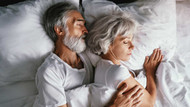Do you feel better after a good night’s sleep? That’s because sleep is essential to your physical, mental and even social wellbeing.
This World Sleep Day is urging people to put their quality sleep first and include it as an essential behaviour that is foundational for good health.
We’ve found a few tips that can help you get better sleep this World Sleep Day.
1. Get healthy sleep
There’s a lot more to healthy sleep than just the amount you’re sleeping.
According to the World Sleep Society1, there are three things you should be focusing on to make sure you’re getting healthy sleep. They are:
-
The length of time you’re sleeping for, which should be long enough that you are rested and alert the next day
-
If you’re sleeping without disruptions, which means that when you’re asleep, you stay asleep
-
The depth of your sleep, which focuses on whether or not your sleeping is deep enough to feel restorative the next day
2. Check the amount of alcohol and caffeine you’re having before bedtime
Creating a relaxing environment before you go to bed is important for well-rested sleep.
Caffeine and alcohol are stimulants2, which generally increase the amount of times you wake up during the night and decrease your quality of sleep throughout the night.
By reducing the amount of caffeine you have four to six hours before bedtime, limiting the amount of alcohol you drink to one to two drinks or less per day and avoiding drinking within three hours of your bedtime can help ensure you’re going to get a quality night’s rest.
For more tips on getting a better night's sleep, explore our Sleep Health Content Hub.
3. Doing your best to avoid common sleep problems
Although you’ve been trying to get more sleep, some people still experience some sleep problems, including restricted sleep and sleep apnoea3.
Restricted sleep, also known as a frequent lack of sleep, can be caused by a number of issues, including social or work patterns that reduce your sleep time, using bright-lit electronic technology in bed that over-stimulates your brain or not winding down before you go to sleep.
Sleep apnoea occurs when the throat or upper airway is obstructed and causes the person sleeping to stop breathing for short periods. Breathing starts up again when the person wakes up, but this can be for a short time as the person isn’t even aware that they are awake.
Therefore, this waking can happen hundreds of times each night and impacts your quality of sleep.
If you’re worried about whether you’ve got sleep apnoea, book a Sleep Apnoea test at your local Blooms The Chemist today. Our friendly Pharmacists are more than happy to take you through the process and help you get the quality sleep you deserve.
References
1World Sleep Day, Toolkit, accessed 2 March, 2023
2Harvard Medical School, Twelve Simple Tips to Improve Your Sleep, accessed 2 March, 2023
3Government of South Australia, Good Sleep = Good Health, accessed 2 March, 2023

